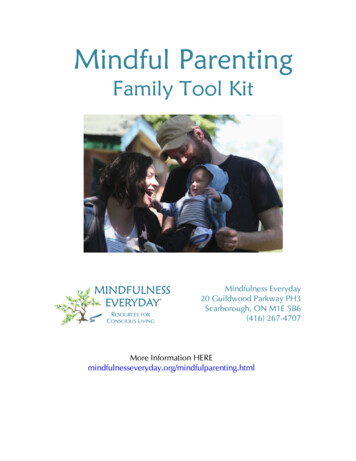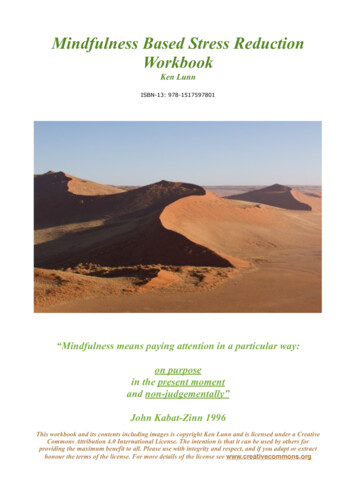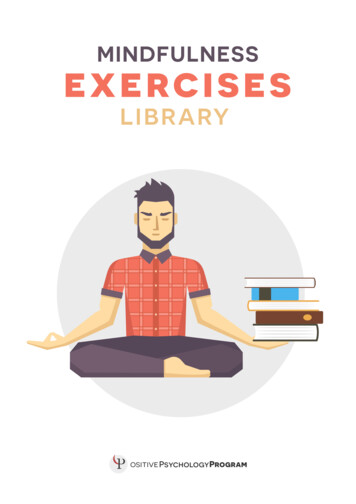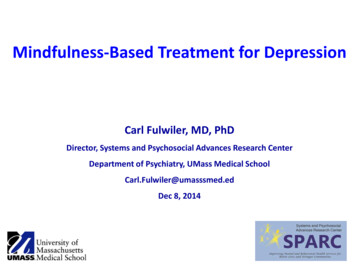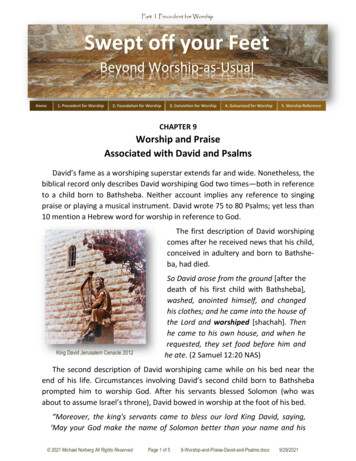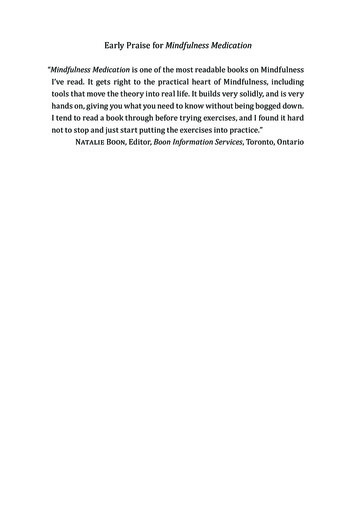
Transcription
Early Praise for Mindfulness Medication“Mindfulness Medication is one of the most readable books on MindfulnessI’ve read. It gets right to the practical heart of Mindfulness, includingtools that move the theory into real life. It builds very solidly, and is veryhands on, giving you what you need to know without being bogged down.I tend to read a book through before trying exercises, and I found it hardnot to stop and just start putting the exercises into practice.”Natalie Boon, Editor, Boon Information Services, Toronto, Ontario
Early Praise for Mindfulness Medication
MindfulnessMedication
2013 Philip K. Blustein & Mindfulness Medication PublishingAll rights reserved. No part of this publication may be reproduced or transmittedin any form or by any means—electronic or mechanical, including photocopying,recording, or any information storage or retrieval system—without permission inwriting from the publisher.Published by Mindfulness Medication PublishingE-mail: mindfulnessmedication@gmail.comWebsite: www.mindfulnessmedication.comFirst Paperback Edition – June 201317 16 15 14 13 — 1 2 3 4 5 6 7 8 9Library and Archives Canada Cataloguing in PublicationBlustein, Phil, 1950 –, authorMindfulness medication : A physician’s prescription for stress relief /Phil Blustein, MD.Includes bibliographical references.Issued in print and electronic formats.ISBN: 978 – 0 – 9918520 – 0 – 0 (pbk). — ISBN: 978 – 0 – 9918520 – 1 – 7 (pdf).—ISBN: 978 – 0 – 9918520 – 2 – 4 (html)1. Stress management. 2. Stress (Psychology). I. Title.RA785.B68 2013155.9’042TECHNICAL g: Crescent McKeag, Calgary Writing Services, Calgary, AlbertaFront Cover Photograph and Author Portrait: Peter Beech, Photographer, Calgary,Alberta, www.airshots.ca Illustrations: Scott Lewis, Vancouver, British Columbia, www.storyboardlabel.com Design & Production: Jeremy Drought, Last Impression Publishing Service, Calgary,AlbertaPrinted in Canada by Blitzprint Inc., Calgary, Alberta, Canada
MindfulnessMedicationA Physician’s PrescriptionFor Stress ReliefPhil Blustein, MDMindfulness Medication PublishingCalgary, Alberta
for Shira and Jaredwho fill my heart with love and joyand have taught me that wisdom is present at any age
Contents Acknowledgements. ix t Your Body Has in Mind When You Don’t Mind Your Body.5Meet Your Mind.11The Origin of Thoughts.23The Emotional Consequences of Thought.33The Physical Consequences of Thought.35Mindfulness: A Technique to Deal with Stress.41Mindfulness and the Breath.55Mindfulness and the Body.69Mindfulness of the Process of Thought Development. 85Mindfulness: Integrative Practice. 97Meditation: Sitting in Stillness.103Mindfulness in Action: Being Present in the Moment.125The Mindful Mind.135Other Techniques for Stress Management.139Where Does the “I” Come From?. 149Inner Child. 157Dialogue: A Friendly Chat with Your Inner Child.165Empathy for the Inner Child.197Empathy for Others.213Mindfulness of the Inner Child: Putting it All Together.219Some Final Thoughts. 233 Suggestions for Further Reading. 237 Index. 239 About the Author.245
AcknowledgementsIhave had many teachers that have influenced my path. I wouldlike to extend my appreciation for these wonderful teachers, whohave influenced humanity with great knowledge, insight andcompassion.They include the Buddha and many teachers of Spirit Rock and theInsight Meditation Society; Marshall Rosenberg with his wonderfulwork on nonviolent communication; Margaret Paul, Erika Chopich,Hal and Sidra Stone, and John Pollard for their insight on the innerchild.I have been blessed by the following people, each of whom hasoffered helpful support: Crescent McKeag for her great editing; ScottLewis for his playful and creative illustrations; Shelley Cooper for herwonderful computer skills; and Jeremy Drought of Last ImpressionPublishing Service for his expert book design.I would like to further dedicate this book to my family, friends,patients and readers, and finally to my own mind, which creates somany opportunities for me to learn on a continual basis.ix
IntroductionDo you ever have the feeling that you were born into thisworld and someone forgot to give you the driver’s manual foryour own mind? One day you’re sitting in a fancy new luxurymodel, the next, you’re driving around in a clunker. Some days yourmind seems to run on and on but you can’t seem to find the brake.You may find yourself heading from one disaster to another and thesteering wheel won’t respond. You may want to direct your mind in away that’s more peaceful and forgiving but it’s as if you’re sitting in acar that you have no control over. Suddenly, you’re just a passenger inyour own mind, not the driver.So how do you find the driver’s manual for your mind so that you’renot just a passenger on a wild ride? There is no one right answer,however, there is hope. With some reading and diligent practice,think of it as driver training, you will begin to really get a handle onhow your mind works.I have been a doctor now for over thirty years. I work in a hospitalwhere I specialize in things that go wrong with the digestive system.During my time as a medical specialist, I began to notice more andmore, how much of a tremendous role stress seemed to play in mypatients’ medical problems. Patients would come to the hospital withsymptoms of chest pain, heartburn, abdominal pain, diarrhea orconstipation. When I asked what had been going on just before theonset of their symptoms, they often told me that they had been feelingvery stressed about family, work or financial issues. They hadn’t evenconsidered that there might be a relationship between their physicalsymptoms and all the stress in theirlives. If you can effectively dealwith your own stress, there is thereal possibility that you will havefewer medical issues in your life!1
2 Mindfulness MedicationI myself, like everyone else, have struggled with stress and a mindthat wasn’t always so kind to me. I could be happy one moment, sadthe next. I felt, at times, that I had no control over what would popinto my head. I would react automatically to whatever was occurringin my life. I just wanted more calmness and joy, but I was at the mercyof my mind. It became my primary mission to find the best way todeal with this.I became a doctor, read a lot, went to therapy and studied Easternand Western approaches to stress reduction and the workings of thehuman mind. It’s taken me a long time, but I can honestly say thatslowly, I have started to be present in life from a place of greater joy.I’m not so much the victim of my thoughts anymore. I have a greatersense of clarity and understanding about what is happening in mythoughts from moment to moment and this process is constantlyevolving.You and I both have to deal with some stress every single day. It’sa part of life! However, it’s for exactly this reason, the fact that youface stress everyday and somehow keep soldiering on, that you maynot realize when your stress is building up and causing you actualphysical harm. Of course there’s no magic pill or day surgery thatwill cure a high-pressure job, too little time, too many demands, abad relationship, or the daily juggling act of kids and career. You canalways wait until something serious goes wrong and then a specialistlike me might be able to patch you up and send you back out there, butI have a wonderful alternative.I present to you an integrated, novel approach encompassing thebest techniques for reducing the stress in your life that I could find,from my experience with both Eastern and Western practices. Inessence, this approach employs mindfulness to hold your physicaland mental stress and inner-child dialogue to change the paradigmof your thinking which is leading to a painful existence. I recommendthis approach to you now as a pre-scription, a life-insurance policythat will go a long way toward keeping you healthy and well and outof my office. While it’s unrealistic to think that you’ll ever be free ofstress completely, a sense of freedom and happiness comes from theability to be fully present during these stressful experiences, without
Introduction 3amplifying their trauma or identifying with them. When it comes tostressful events, it doesn’t matter what they are, it matters how youare with them.This book is meant to be used; to be revisited again and again. Itreally is all about you! What you put into it, in terms of attemptingwhat I suggest by processing and practicing, will be what you get outof it. Do what works for you and take from it what you can. Everylittle bit of practice will help. Return to reading the rest of the book,in sequence, whenever you’re able to, as each section builds on theone before. In understanding lies real stress-relief.This book serves as a practical sequential guide that will bringyou to an understanding of how your mind works the way it does andwhy it does so. There are effective techniques outlined here that willhelp you to deal with your stress right at the very moment it occurs.There are also approaches that will help you to change the underlyingmechanisms at the root of your unhappiness. Some parts of this bookwill appeal to you, while others may not seem to apply.I’m looking forward to sharing with you what I have found to bepersonally helpful for both my patients and myself. Hopefully, thiswill provide you with your own insight into how to live in this worldwith greater peace and satisfaction. I offer this book to you as areflection of my belief in service. I believe that all of us are connectedthrough our shared humanity and our universal mental suffering.Stress affects every human being on the road of life, but you’re in thedriver’s seat now. Here’s the manual you were looking for.Dr. Phil BlusteinCalgary, AlbertaMarch, 2013
1What Your Body Has in MindWhen You Don’t Mind Your BodyStress is not the only cause of illness but it can certainly makewhat you do have worse. People get sick for multiple reasons,which include genetics, lifestyle issues and environmentaltoxins. Stress is something that all people experience and it can leadto physical problems as well. Stress reflects how you perceive andinterpret the events in your life. Western medicine is fantastic atidentifying and treating physical ailments, but it doesn’t emphasizeand prioritize the contribution of underlying stress to these medicalissues. Most people deal with the consequence, and not the cause, ofan illness.I’d like to introduce you to some of my actual patients so you canstart to connect the dots for yourself:Larry is a big man. He has a big appetite, a big family and when hehas diarrhea it’s a big problem. He has a long-standing history ofCrohn’s disease (an inflammatory condition of the bowel) and hadalready undergone surgery. He was doing quite well, until severalmonths ago. When I inquired, he told me about having to care for hisfather who had recently died, and that he waslaid off from a job that he had been workingat for the last ten years. The economyforced him to take a new job that he reallyhated, for less pay. He and his wife wereconstantly battling over finances. Hisdiarrhea and abdominal pain had becomeprogressively worse and worse until heended up with a bowel obstruction that couldonly be corrected by yet another surgery. Hehad ignored a growing problem for a long time5
6 Mindfulness Medicationbut his body hadn’t. I was frustrated that I could only try to fix thedamage done after the fact, instead of helping Larry learn how tointerfere with the progression of his disease while he still had achance to avoid the knife.Mika is another of my patients but she is representative of so many.She had recently come from Thailand to work in Canada. It was a newjob, a new language and a new culture. She had left her family backhome and they were depending on her to send back money to supportthem. Clearly under tremendous pressure, she began to experienceproblems with abdominal pain and an irregular bowel pattern withalternating diarrhea and constipation, gas and bloating. She alsobegan having difficulty sleeping and was experiencing headachesand fatigue, which are often some of the first symptoms of ongoingstress. All of her medical tests came back normal and I diagnosed herwith Irritable Bowel Syndrome. Again, Mika’s body was reacting tothe levels of stress in her life and I was forced to just help her treather symptoms, knowing that until she lowered her stress levels, shewas in for more suffering, pain and grief.What’s common to both of these patients and many others, is thattheir symptoms are really secondary to, or aggravated by, the stressin their lives. Their symptoms are what western medicine calls ‘stressinduced’. If they had been able to understand what their stress levelswere doing to their bodies before it made them sick and if they alsohad some help to then reduce their stress, perhaps I may never havemet them at all!Let’s start by taking a look at what both Eastern and Westernphilosophies have to say about how you create and deal with stress.Both schools of thought offer tremendous insights. Rather than seeingthem as separate, I have tried to integrate the tools and conceptsthat I have found to be most useful, regardless of point of origin.This integrative approach merges the best of Eastern and Westernphilosophy, medicine, and psychology as a means to understand themind, how each of us creates stress, and how you can best learn tomanage and minimize it.
What Your Body Has in Mind 7Autonomic Physical and Psychological ResponsesHave you ever had to consciously tell your heart to beat, or your lungsto breathe, in order to make sure that they were doing their jobs?Your heartbeat and breathing are both examples of what scientistscall autonomic involuntary behaviours. That’s a fancy way of sayingthat these biological activities carry on independently, without youhaving to be actively aware of what’s going on. The same can besaid for a lot of the mental activities that carry on in your life. As anexample, see if any of the following scenarios are familiar to you: Have you ever had an experience where you drove from onespot to another and have suddenly realized that you don’trecall driving the last few blocks, or even the whole tripsometimes? Have you ever mindlessly eaten something without reallytasting any of it because you were thinking about somethingelse? Have you ever reacted to a situation with such intensity andanger that your response was way over the top and then youwondered later, “Where did all that come from?” Do you have an inner voice that’s constantly critical andwhich seems to always have something negative to say, as itevaluates your actions and appearance and how you compareto others?Your mind is constantly thinking, evaluating and judging, as wellas going over what happened in the past and your plans for the future.This is, in fact, the normal function of the mind. Just as your heartbeats and your lungs breathe, your mind thinks. It’s what it doesnaturally, but unlike the moment-to-moment activities of the heart,or the lungs, the automatic thoughts that go through your head aresomething that can be observed, examined, changed and released.Your thoughts are the product of your experiences, your history, yourbiology and most importantly, your habits. External events conspirewith the internal workings of your mind to create stress.
8 Mindfulness MedicationBut you’re not simply a robot that follows the automatic directionsof your mind. You can actually think about your thoughts. You canexamine what’s going on in your mind and what your mind says toyou. Because your mind has the ability to literally think about itself,you can often find ways in which your habitual patterns of thoughtare maintaining a stress response.The physical stress response that occurs when your mindperceives a threat is a powerful one. When Larry first lost his job,he thought constantly about how catastrophic this turn of eventswas. He felt that it was a threat to his financial and social status andpotentially a threat to not only his own survival, but also the survivalof his family. His body in turn helped him out by releasing adrenalineand cortisol, the body’s alarm bells, as well as other chemicals. Thesechemicals prepared him to fight or run, as if the origin of the threatwere a predatory animal out for his blood. Physically, his heartbeatand breathing rate increased. His blood pressure rose and his mouthwent dry. The pupils of his eyes grew bigger and his muscles receivedmore blood in preparation for an immediate action like running orpunching, but there was no one to run from and certainly no one topunch!As he continued worrying about his situation, his body couldnot sustain the initial stress response. It tried to adapt but couldn’tkeep it up. He wasn’t sleeping well. His immune system also stoppedworking very well, so he got every cold and flu bug going around. Hewas tired all the time, because it’s hard work for the body to stayready to fight, or run, around the clock. His digestive system was amess. Needless to say, that even when Larry got a new job, he wasstill worried about making ends meet and his body continued to ‘helphim’ by keeping up all the stress responses as best it could, until oneby one, his body’s systems and processes began to break down.Larry, of course wasn’t aware of what his body was up to inresponse to his constant worrying. He only knew that he didn’t feelthe best and it was getting worse not better. The body really triesnot to bother you with trivial things like the fact that your heart isbeating, your food is being digested and your lungs are supplyingoxygen one breath at a time, until and unless it really can’t cope
What Your Body Has in Mind 9anymore. That’s when you’d come to me, but by then it’s often toolittle too late. By learning to recognize the early symptoms of toomuch stress and what both your body and your mind are trying totell you, you can intervene earlier in the process.I think that you can probably relate to the fact that your life ishectic and often you feel a sense of stress about the events that youencounter. You know that there’s a problem and it would be greatif you could have some tools to help you deal with your issues. Thenext chapters outline how your mind works to create an intimateconnection between your thoughts and your emotional and physicalresponses, but let’s cut right to some solutions.Eastern philosophies offer some powerful antidotes to the stressresponse that are being incorporated more and more into the frontiersof Western medical practices. The Eastern concept of mindfulnessallows you to create some much needed space in the mind as it were;so that you can then use the Western based techniques of Inquiry andInner-child Dialogue to understand the origins of your belief system.Your stress response really depends on how you react to your ownthoughts. Mindfulness is simply the process of trying to be aware, inan accepting and non judgmental way, of what you’re thinking about,what you’re feeling, and what your body is up to. Inquiry and Innerchild Dialogue are based on investigations into how belief systemsand patterns of behaviour develop and persist from childhood toaffect your adult responses.The technique of mindfulness allows you to be present and awareof what’s on your mind, without identifying quite as strongly withthe stories that you habitually tell yourself and without needing tochange anything about the experience you’re actually having. It’s away of practicing how to not get so carried away. It’s this bringingtogether of Western insight into the nature and origin of thought, andthe Eastern tradition and practice of mindfulness that can provide thetools to live, not free of thought, but with the freedom to have yourthoughts along with an extra-helping of peace of mind. When you getbetter at minding your mind, your body won’t have a mind of its own!
10 Mindfulness MedicationPractice1. Think of times in the past when you felt sick that you nowknow were related to stress.2. How do you personally experience stress in your thoughts,feelings and body?Summary Stress can make you sick or make what physical problems youdo have much worse. Your thoughts are what trigger the body’s stress response. Once the body’s stress response is triggered, it continues toaffect you without you necessarily being aware of it until itcan no longer cope and its resources are exhausted. The technique of combining Eastern mindfulness practiceswith Western investigation into belief systems and the natureand origin of your thoughts can provide excellent stressrelief.
2Meet Your MindIn the last chapter, you were introduced to the fact that onceyour mind starts thinking that there’s a threat, something goingwrong in your internal or external environment, it starts a physicalprocess in your body whose initial purpose is to help you to betterdeal with that threat. If you don’t think that the threat is gone, thenyour body begins to not work as well, bit-by-bit, until eventually you’llneed a doctor. However, the initial perception of a threat occurs inyour mind as a thought. What one person thinks is very threateningand stressful someone else may not.Mika, my patient from Thailand, for example, grew up with verydeadly snakes in her home country and has been afraid of them sincechildhood. Larry has a pet snake and it sits wrapped around hisshoulders and watches TV with him. What Mika thinks of as stressful,in this case the sight of a snake, Larry thinks of as fun or interesting.Their thoughts about the same snake are very different.So if stress is dependent on your thoughts about something, let’stake a look at thoughts, what they are and where they come from.Some insights into how your mind works can help you better managethe stress in your life.I’m going to lead you through some exercises that will open thedoor to understanding your own thought processes. This is a step-bystep journey of personal discovery that will give you an understandingof your own mind, the driver of your actions.How many thoughts do you have?The average person has about 60,000 thoughts a day. Further, 90%of these thoughts are the same repetitive notions playing over andover. You’re constantly thinking, but most people are not consciously11
12 Mindfulness Medicationaware of the type of thought passing through, how often it comesaround, or what triggers that particular thought. Your mind is likea popcorn machine, constantly popping up thoughts, but you’re onlyconsciously aware of a small percentage of them.Let’s try something. See if you can count every thought that comesinto your consciousness. Even if the thoughts seem to be somethingalong the lines of the following: “This is stupid.”“I wonder how long it’s been.”“I need to do laundry and get to the store.”“Is that one thought or two?”Just try to count them as best you can.HSet a timer for two minutes. There are countdown timersavailable online, as various apps, or you can set an egg timer,watch, or cell-phone timer. Close your eyes. Count yourthoughts and return to reading the book after you’re through.How many thoughts did you have? Were you surprised by howmany you had? They certainly aren’t permanent. If you wait longenough a new thought will always come up. Imagine how manythoughts you’re not even aware of.As you begin to observe your mind, you’ll notice that it’s alwaysactive and that it tends to say the same things over and over again.Let’s admit it, most of the time we allhave pretty boring minds.You probably get so caughtup in your thoughts, just byforce of habit, that even whenyou’re sitting silently you’renot really at rest. If you mentionto someone that you’re going togo away on a silent retreat, oftenhis or her initial reaction is, “I
Meet Your MInd 13couldn’t do that. I could never sit still. My mind is always thinking.” Ofcourse it is! Thinking is what the mind does. It’s the natural functionof the mind, but you’re not necessarily at its mercy.What’s the nature of your thoughts?Once you start looking in on your thoughts you’ll probably noticethat most of them seem to be about reliving the past, or planningfor/imagining the future. Few of them tend to be about the presentmoment.Let’s jump right into another exercise. When a thought pops up, Iwant you to name the time period when it seems to be occurring. Youcan say past, present, or future.HSet your timer for two minutes again. Close your eyes and notewhen, in time, your thoughts are occurring. Return to the bookwhen you’re done.Were your thoughts predominantly about events that happened inthe past? Were your thoughts predominantly about events that mayoccur in the future? Or were they focused on the present moment asit unfolded?The future hasn’t happened and therefore doesn’t exist as yet andthe past has already gone by and therefore also doesn’t exist in thehere and now. The present, this very moment, is the only time thatyou have any real control over. If your thoughts tend, as most do, tothe future or the past, you’re missing out on a lot of the right now.You’re generally not fully present to the beauty of the only moment intime that truly exists!Another aspect of thought is that it’s largely concerned withjudging, comparing and criticizing. Your mind is constantly evaluatingevery external and internal situation that you encounter.Here’s another exercise to help you understand your own thoughts.This time you’re going to pick a word that basically describes whatthe thought is about as it happens. Say something to yourself like
14 Mindfulness Medicationcriticizing, or planning, or worrying, or judging, or remembering.You don’t have to say your description words out loud but you can ifyou like.HSet your trusty timer for two minutes. Close your eyes. Notewhat your thoughts are about and return to the text whenyou’re done.So what were your thoughts about? Were they about an argumentyou had with your partner yesterday? Judging your boss for whathe said to you? Criticizing yourself for something you did, or said, toyour family? Minds are often not very friendly!It’s important to become familiar with what your mind is sayingto you. Try these short, two-minute exercises whenever you have amoment during the day. The more familiar you are with your ownmind, the easier it will be for you to intervene in your stress responses.How easy is it to be distracted by your thoughts?Now that you’re getting a bit more familiar with your own mind, let’stry a few more experiments.I would like you to close your eyes and simply observe your breath.This time, you’re going to count to ten. Breathe in and out. Thatcounts as one cycle. Mentally count one. Another cycle of inhalationand exhalation is number two and mentally count two. Continue likethis to a count of ten. If a different thought arises, other than mentallywatching your breath-cycles and counting them, then start right backat the beginning at one. Simple right?It’s important that you really try to do all of the experiments andpractice suggestions in this book. Real positive change comes fromdoing, not just from reading.HGive this breath exercise a try right now and then return to thebook when you’re through. Set your timer for two minutes andclose your eyes.
Meet Your Mind 15So how far did you get? Sometimes I can’t get beyond one ortwo breath-cycles before another thought pops up! Your mind isconstantly thinking and as amazing as it is, you probably can’t evenmaintain your concentration for ten breaths. It can be very difficultfor you to develop the concentration to be mentally present and fullyaware of what’s going on in the here and now. Your mind is like a littlehummingbird, flitting from one sensation, thought or perception tothe next. Your thoughts are very powerful and can easily pull youaway from what you’re doing. You can get carried away into yourvarious mental worlds at the drop of a hat, which leads us to the nextconcept.Can your thoughts be just on the pres
Early Praise for Mindfulness Medication “Mindfulness Medication is one of the most readable books on Mindfulness I’ve read. It gets right to the practical heart of Mindfulness, including tools that move the theory into real life. It builds very solidly, and is very hands on, gi
